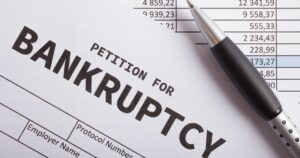How much debt should you be in before filing bankruptcy? A common question on consumer minds is whether or not they have enough debt to justify filing for bankruptcy. The answer is not as simple as “X dollars” is the threshold. Instead, it comes down to your unique financial situation, the type of debts you have, and your means to pay them off (if any).
There is no minimum debt requirement to file for bankruptcy, so knowing the other issues that affect whether you qualify, and then considering if it is the right financial step for you, is the best way to answer the question. Most importantly, you should meet with a bankruptcy attorney to explore your options and see if bankruptcy is the right solution given your situation.
The Federal Bankruptcy Court Does Not Require a Minimum Debt
The courts don’t have a minimum debt requirement to file, so obviously considering how much debt you have is a big consideration when looking at bankruptcy relief. You need to decide if bankruptcy is right for you based on not only the total amount due but some other factors like:
- Is your income sufficient enough to pay down the debts without using bankruptcy?
- Are your creditors willing to work payment plans out with you to help you pay back the obligations?
- Can you even discharge the debts you have?
- Do you have a job or are you unable to work and earn a living to pay off your debts?
Bankruptcy Should Be a Last Resort
While bankruptcy does give you instant relief from creditor collections and harassment, and it will help you get rid of debts you cannot afford to pay, it is not something you should use as a quick fix to poor financial habits. Bankruptcy does stay on your credit report for 10 years. And while you have that bankruptcy on your credit report, you may be unable to get a loan for a home, car, or even student loans.
Furthermore, once you file for bankruptcy and you complete it, you cannot re-file immediately after. Therefore, you need to correct whatever financial issues led to you having to file for bankruptcy. Otherwise, they will only continue to repeat themselves, and you may be back in the same situation in just a year or so.
Considering the Factors
Before you decide bankruptcy is the right solution for you, you first need to consider all factors. You should go over these with an attorney that specializes in consumer bankruptcy, too.
Your Income – Can You Pay Off Your Debts?
First, your income needs assessment. Do you have enough disposable income to pay down your debts? Is your income higher than the average of a family of similar size in the area? Are you living beyond your means and have places to cut back so that you could afford to pay down your debts?
Part of filing for Chapter 7 requires that you take a means test, which evaluates your income and compares it to the standard in your area. Therefore, when your income is well above average, and you have the disposable income to pay down your debts, you would not qualify for Chapter 7. That doesn’t mean you have no options. Instead, you could file for Chapter 13, which lets you restructure and pay a single monthly amount that goes toward your debts.
Have You Spoken with Your Creditors?
Creditors want their money, and when you file for bankruptcy, they will not get much from you afterward. Therefore, most creditors are willing to work with you to arrange more favorable payment terms, and sometimes, even lower interest rates. If the creditors refuse to work with you, however, you may have no other choice but to file for bankruptcy and get relief.
Do Your Debts Even Qualify for Bankruptcy?
You may have $12,000 in debt. But if $10,000 is from student loans and the other $2,000 from credit cards, bankruptcy may not be the right choice. When you file for Chapter 7 bankruptcy, certain debts are disqualified, meaning you cannot discharge them.
These include child support and alimony, back-owed taxes (up to so many years), and student loans. Also, settlements from personal injury cases are not discharged in bankruptcy. Therefore, if most of your debt falls under the non-dischargeable category, then Chapter 7 will not work for you.
Will Your Employment Situation or Financial Situation Improve?
Sometimes, a person may panic after losing their job and think that they need to file for bankruptcy at least until they find work again. While this does resolve your debt issues, how long will you be out of work and when would your financial situation improve?
If you are able to return to work and you could do so in just a month or two, then filing for bankruptcy may not be the best financial move. If, however, you have become permanently disabled and cannot work, or if you have a serious medical condition that has forced you into debt, then filing for Chapter 7 could be the solution you need.
Considering Bankruptcy? Speak with a Local Bankruptcy Attorney First
If you find yourself facing an insurmountable amount of debt, you just cannot catch up to your payments, contact us today for a no-obligation consultation.
During a bankruptcy consultation appointment, we will go over the factors above along with other factors unique to your situation. Our goal is to educate you on the process of bankruptcy, how it will affect you, and what you must do to successfully file. Furthermore, we will present you with your options so that you know if Chapter 7 or Chapter 13 is the best financial route to take for you and your family.
To get started, schedule your confidential consultation with our bankruptcy team.

